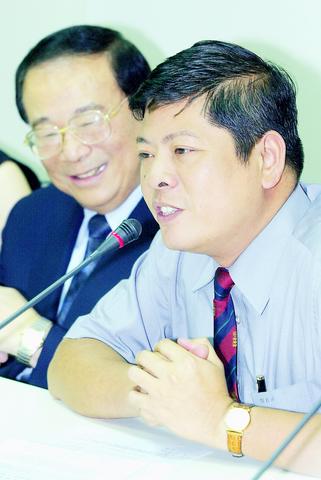After aligning himself with the DPP legislative caucus last session, independent Legislator Eugene Jao (趙永清) has become a dues-paying member of the ruling party.
The move, though unsurprising, injects an extra dose of euphoria into the party, which has won a number of crucial votes in the legislature despite its lack of a majority.

PHOTO: CHIANG YING-YING, TAIPEI TIMES
Dubbed a "sunny boy," Jao said he was attracted to the party's commitment to the principles of democracy and justice.
"It is my firm belief that justice should take precedence over partisan concerns, as no mortal can outlive the system," he told a news conference yesterday, flanked by well-wishers including incoming DPP secretary-general Chang Chun-hsung (
The four-term lawmaker, known for his staunch anti-nuclear stance, urged the DPP government to strive to make Taiwan nuclear-free and to push for referendum and anti-corruption laws.
"Let's give equal emphasis to economic development and environmental protection," said Jao, who broke ranks with the KMT last year over its energy policy. "Only then, can the inhabitants of this land enjoy a safe life."
In a sign of the warmth of the DPP's welcome, Chang said that the KMT would still be in in power if it had more members like Jao. "If that were the case, there would have been no need for the DPP to exist in the first place," he added.
Jao, 45, has been representing Taipei County for the past decade. His father and brother were former members of the National Assembly and now-defunct Provincial Assembly under the KMT banner.
In Oct 2000, the KMT suspended Jao's party membership after he joined with anti-nuclear groups in opposing construction of the partially built Fourth Nuclear Power Plant.
The following January, the KMT revoked his membership after he formed the People's Union (
Incensed by the plant's revival, Jao launched a signature drive in a bid to oust then-premier Chang and pressured the Cabinet to call a popular vote on the fate of the project.
Neither Jao nor Chang made any mention of the episode yesterday.
Calling himself a supporter of the middle-road policy trumpeted by President Chen Shui-bian (
"Political stability will be more attainable if the country has only two parties," he said.
Indeed, Chen and Premier Yu Shyi-kun both signed the column of reference in Jao's application form.
The frank-speaking lawmaker, however, did not hide his reservations about the pro-independence clause enshrined in the DPP charter.
He suggested the party adopt more pragmatism when dealing with cross-strait affairs, noting that relations between Taiwan and China have undergone substantial change over the years.
"It is time the DPP platform, drafted when the party was in opposition, be amended to stay in tune with reality," Jao said.
Also, he confessed he is not fully at ease with factional wrangling inside the party and has no intention of joining any faction for now.
"For better or worse, at least the DPP allows its members to make known their opinions during the decision-making process, a practice that is unimaginable in the KMT," Jao said.
While a KMT member, Jao belonged to the Reformist faction where he and colleagues such as Apollo Chen (陳學聖) and Chu Li-luan (朱立倫) sought to revitalize the party -- but to no avail.
"In the end, I was expelled from the party myself," he said, adding that more will follow when the time is right.
Apollo Chen, for instance, has often complained about "being lonely," he said.

An essay competition jointly organized by a local writing society and a publisher affiliated with the Chinese Communist Party (CCP) might have contravened the Act Governing Relations Between the People of the Taiwan Area and the Mainland Area (臺灣地區與大陸地區人民關係條例), the Mainland Affairs Council (MAC) said on Thursday. “In this case, the partner organization is clearly an agency under the CCP’s Fujian Provincial Committee,” MAC Deputy Minister and spokesperson Liang Wen-chieh (梁文傑) said at a news briefing in Taipei. “It also involves bringing Taiwanese students to China with all-expenses-paid arrangements to attend award ceremonies and camps,” Liang said. Those two “characteristics” are typically sufficient

A magnitude 5.9 earthquake that struck about 33km off the coast of Hualien City was the "main shock" in a series of quakes in the area, with aftershocks expected over the next three days, the Central Weather Administration (CWA) said yesterday. Prior to the magnitude 5.9 quake shaking most of Taiwan at 6:53pm yesterday, six other earthquakes stronger than a magnitude of 4, starting with a magnitude 5.5 quake at 6:09pm, occurred in the area. CWA Seismological Center Director Wu Chien-fu (吳健富) confirmed that the quakes were all part of the same series and that the magnitude 5.5 temblor was

The brilliant blue waters, thick foliage and bucolic atmosphere on this seemingly idyllic archipelago deep in the Pacific Ocean belie the key role it now plays in a titanic geopolitical struggle. Palau is again on the front line as China, and the US and its allies prepare their forces in an intensifying contest for control over the Asia-Pacific region. The democratic nation of just 17,000 people hosts US-controlled airstrips and soon-to-be-completed radar installations that the US military describes as “critical” to monitoring vast swathes of water and airspace. It is also a key piece of the second island chain, a string of

The Central Weather Administration has issued a heat alert for southeastern Taiwan, warning of temperatures as high as 36°C today, while alerting some coastal areas of strong winds later in the day. Kaohsiung’s Neimen District (內門) and Pingtung County’s Neipu Township (內埔) are under an orange heat alert, which warns of temperatures as high as 36°C for three consecutive days, the CWA said, citing southwest winds. The heat would also extend to Tainan’s Nansi (楠西) and Yujing (玉井) districts, as well as Pingtung’s Gaoshu (高樹), Yanpu (鹽埔) and Majia (瑪家) townships, it said, forecasting highs of up to 36°C in those areas